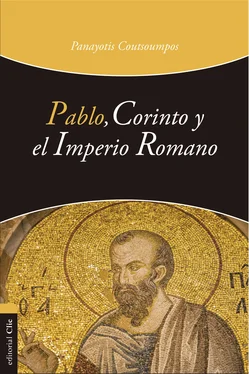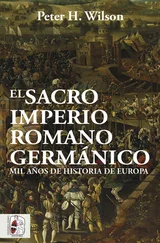7. P. Perkins, First Corinthians. Paideia Commentaries on the New Testament (Grand Rapids: Baker Academic, 2012), 16. “A pesar de los esfuerzos de algunos eruditos de fechar el edicto más temprano, al año 41, la fecha generalmente aceptada del año 49 se sostiene. Por lo tanto, la misión de Pablo en Corinto comenzó cerca del año 50”.
8. P. Perkins, First Corinthians. 3. “El destierro de personas responsables de disturbios cívicos era rutinario”.
9. Andrew D. Clarke, Rome and Italy in The Book of Acts in Its First Century Setting: Greco-Roman Setting. vol 2. Edited by David W. J. Gill and Conrad Gempf (Grand Rapids: Eerdmans, 1994), 469.
10. Dio Cassious, Roman History 60.6.6.
11. Suetonius, Divus Claudius 25.4.
12. Gerd Lüderman, Paul, Apostle to the Gentiles: Studies in Chronology (London: SCM, 1984), 157-75.
13. L.C.A. Alexander, Chronology of Paul in Dictionary of Paul and His Letters. Editors: G. F. Hawthorne, R. P. Martin, and D. G. Reid (Downers Grove: InterVarsity Press, 1993), 120.
14. Acts 18: 1-2.
15. Jerome Murphy-O’Connor. St. Paul’s Corinth: Texts and Archaeology (Collegeville: The Liturgical Press, 2002), 152.
16. Suetonius, Divus Claudius 25.4.
17. Orosius, Historia adversun pagana 7.6.15
18. Murphy-O’Connor, St Paul in Corinth , 153.
19. Tacitus, Annals 2.85.
20. Schnelle, Apostle Paul , 48.
21. Suetonius, Nero 33.1. Mencionó que Nerón canceló las decisiones y decretos de Claudio.
22. Lüderman, Paul, Apostle to the Gentiles , 186.
23. Murphy-O’Connor, St Paul’s Corinth, 155.
24. Josephus, Antiquities of the Jews 19.287-91. 288. “A petición de los reyes Agripa y Herodes, personas muy queridas para mí, debo conceder los mismos derechos y privilegios a los judíos que están en todo el Imperio romano, lo que he concedido a los de Alejandría, estoy muy dispuesto a cumplirlo”.
25. Perkins, First Corinthians, 16.
26. Murphy-O’Connor, Keys to First Corinthians, 183.
27. Séneca, Ep. 104.1. Gallo estaba enfermo con fiebre cuando estuvo en Acaya. Así que es probable que no estuviera su año completo en el cargo.
28. Schnelle, Apostle Paul, 49. “El arribo de Pablo a Corinto a principios del año 50 proporciona un punto sólido desde el cual la cronología relativa de su actividad puede ser calculada tanto más tarde como más temprano”.
29. Joseph A. Fitzmyer, First Corinthians. Anchor Yale Bible 32 (New Haven: Yale University Press, 2008), 40-42.
30. Nigel Watson, The First Epistle to the Corinthians (London: Epworth Press, 1992), xx.
31. Acts 18:1-8.
32. Ben Witherington, Conflict & Community in Corinth: A Socio-Rhetorical Commentary on 1 and 2 Corinthians (Grand Rapids: Eerdmans, 1995), 73.
33. Murphy-O’Connor. St. Paul’s Corinth, 151. Grant, Paul in the Roman, 9. Ver también Victor P. Furnish, Corinth in Paul’s Time: What Can Archaeology Tell Us? Biblical Archaeology Review Vol. XV (1988): 14-27. Ver también D. W. J. Gill and Conrad Gemph, The Books of Acts in its First Century Setting (Grand Rapids: Eerdmans, 1994), 448.
34. Perkins, First Corinthians, 18.
35. Norman T. Wright, Paul’s Gospel and Casear’s Empire in Paul and Politics: Ekklesia, Israel, Imperium, Interpretation. Edited by Richard A. Horsley (Harrisburgh: Trinity Press International, 2000), 166.
36. Ciampa and Rosner, The First Letter, 11-12.
37. Perkins, First Corinthians, 18-19.
38. E.P. Sanders, Paul (Oxford: Oxford University Press, 1991), 6-7.
39. Coutsoumpos, Paul and the Lord’s Supper, 72.
40. Ciampa and Rosner, The First Letter, 5.
41. Grant, Paul in the Roman World, 10.
42. Gill and Gemph, The Books of Acts, 450.
43. Puskas and Reasoner, The Letters, 91.
44. Philo, Legatio ad Gaium 281-82.
45. Coutsoumpos, Paul and the Lord’s Supper, 73-75.
46. Hechos 18:2.
47. Schnelle, The History and Theology, 58.
48. Grant, Paul in the Roman, 6-7.
49. Wintherington, “ Conflict & Community”, 26.
50. Schnelle, Apostle Paul, 124. “La misión de los gentiles de la iglesia de Antioquía no fue la única en el cristianismo primitivo, como lo demuestra la fundación de la iglesia romana y la aparición de Apolos de Alejandría en Corinto (1 Corintios 3: 4 y Hechos 18: 24-38)”.
51. Fotopoulos, Food Offered to Idols, 51.
52. Panayotis Coutsoumpos, The Social Implication of Idolatry in Revelation 2:14: Christ or Caesar? Biblical Theology Bulletin 23 (1997): 23-27. Ver también Fotopoulos, Food Offered to Idols, 49.
53. Anthony C. Thiselton, 1 Corinthians: A Shorter Exegetical & Pastoral Commentary (Grand Rapids: Eerdmans, 2006), 77-81.
54. Mark T. Finney, Honor, Rhetoric and Factionalism in the Ancient World: 1 Corinthians 1-4 in Its Social Context . Biblical Theology Bulletin 40 (2010): 27-36.
55. Perkins, First Corinthians, 11. “La competencia retórica no solo sirvió para avanzar en la carrera pública de quienes podían permitirse este tipo de formación, sino también para proporcionar capacitación. La audiencia de Pablo en Corinto parecía estar enamorada de tal vultuosidad verbal de ‘sabiduría de palabras’”. (1 Corintios 1: 20-21, 2: 1-5).
56. Richard A. Horsley, 1 Corinthians, Abingdon New Testament Commentary (Nashville: Abingdon Press, 1998), 43-44.
57. F.F. Bruce, I & II Corinthians. The New Century Bible Commentary (Grand Rapids: Eerdmans, 1980), 32. “Cloé no es conocida, pero probablemente era una mujer de sustancia con una ‘familia’ de sirvientes, algunos de los cuales, miembros de la iglesia de Corinto, habían visitado recientemente a Pablo o le habían enviado una carta y le habían dado informes de la iglesia”.
58. Ian J. Elmer, Paul, Jerusalem and the Judaisers (Tübingen: Mohr Siebeck, 2009), 4. También observa que “el partido de Cristo y el partido de Cefas formaron una facción que se opuso al Partido Paulino representado por una inflación similar en las lealtades a Pablo y su compañero de trabajo, Apolos”.
59. Wintherington, Conflict & Community, 95. “El grupo estaba en peligro de fragmentarse debido a diferentes clases de divisiones sociales y comportamientos no unificadores”.
60. Finney, Honor, Rhetoric , 30.
61. Murphy-O’Connor, St. Paul’s Corinth, 184-185.
62. L.L. Welborn, “ On the Discord” en Corinth: 1 Corinthians 1-4 and Ancient Politics, Journal of Biblical Literature 106 (1987): 87.
63. Finney, Honor, Rhetoric, 31ss.
64. Homero, Iliada, bk 6, 206-10.
65. Robert Jewett, Paul, Shame and Honor in Paul in the Greco-Roman World: A Handbook. Edited by J. Paul Sampley (Harrisburg: Trinity Press International, 2003), 552.
66. Finney, Honor, Rhetoric, 28.
67. Dio Chrysostom, Orations 35.41.
68. Perkins, First Corinthians, 49.
69. Marcel Simon, From Greek Hairesis to Christian Heresy in Early Christian Literature and the Classical Intellectual Tradition. Edited by W. Schroedel & R. Wilken (Paris: Editions Beauchesne, 1979), 109.
70. Finney, Honor, Rhetoric, 32.
71. Plutarch, Moralia 485A-486D.
72. Coutsoumpos, Paul and the Lord’s Supper, 73.
Читать дальше












